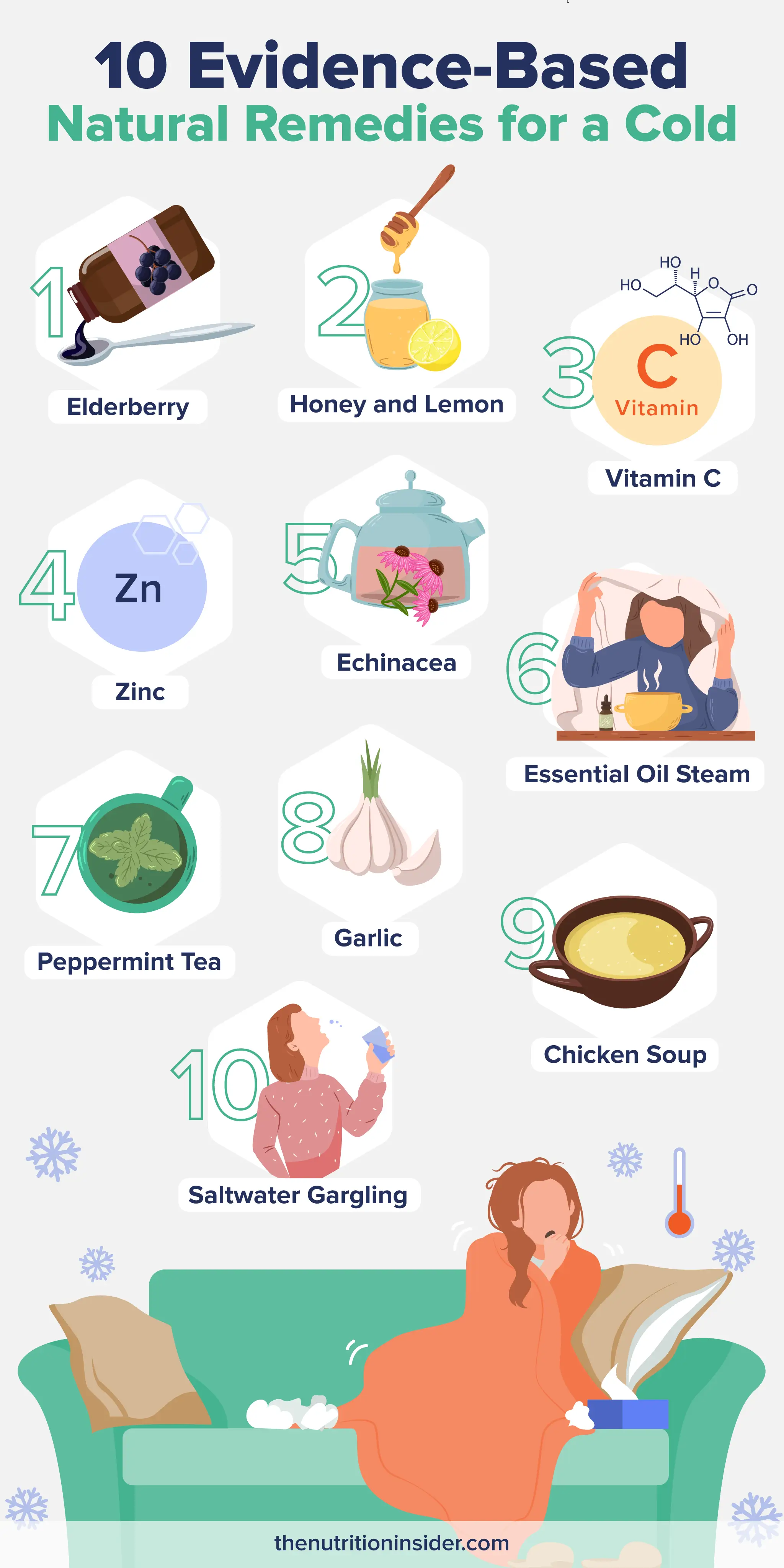This post contains links through which we may earn a small commission should you make a purchase from a brand. This in no way affects our ability to objectively critique the products and brands we review.
Evidence-Based Natural Cold Remedies for the Winter
Evidence Based Research To fulfill our commitment to bringing our audience accurate and insightful content, our expert writers and medical reviewers rely on carefully curated research.
Read Our Editorial Policy
As we get deeper and deeper into the winter season, many people are struck with the sniffles, sneezing, and coughing that comes along with the oh-so-common cold.
If you are wanting to avoid the DayQuil, Zicam, and Mucinex and go a more natural route, there are plenty of herbal or holistic remedies that can help and actually have evidence behind them.
As the common cold (rhinovirus, if you want to get technical) is a viral infection, these at-home natural cold remedies won’t cure the illness, but they can alleviate symptoms, speed up the duration, and make you feel more comfortable—plus, you may already have some of them in your kitchen.
10 Natural Remedies for a Cold

1. Elderberry
Elderberry is a commonly used natural supplement for supporting the immune system and helping with cold and flu symptoms, which is likely due to its elevated antioxidant and anti-inflammatory properties and vitamin C content.
Research has shown that elderberry also has antiviral properties, reducing the duration or severity of illness like the common cold and upper respiratory infections.1,2
Elderberry supplements come in many forms, including gummies, capsules, syrups, and tonics. We love Carmel Berry Company for their formulas without refined sugar and use of fresh-pressed elderberries from American farms.
2. Honey and Lemon
Honey and lemon are an all-star duo, both in flavor and benefits for remedying a cold. Honey has natural antibacterial and antiviral properties—in fact, it has been used for wound healing and fighting infections since ancient times.3
Modern research has validated its use, as seen in this meta-analysis of 14 studies. Researchers found that honey improved symptom scores, cough frequency, and cough severity in people with colds or upper respiratory infections.4
The authors concluded that “Honey was superior to usual care for the improvement of symptoms of upper respiratory infections. It provides a widely available and cheap alternative to antibiotics.”
Mixing honey, lemon juice, and warm water is an excellent and effective natural remedy for colds, especially those with sore throats and coughing.
3. Vitamin C
Vitamin C is the most well-known nutrient for supporting immune system health. It’s been found to help heal wounds, provide antioxidant activity, and boost collagen production.
However, not all studies show that vitamin C prevents colds—rather, it may work best to shorten the duration or severity of a cold.
One meta-analysis of 10 trials concluded that vitamin C supplements significantly reduced the duration of the common cold by 15%, especially in more severe cases.5 You can get vitamin C from food—like citrus, broccoli, and bell peppers—or supplements like these.
4. Zinc
Zinc is another essential nutrient for immune health, as it regulates cell signaling, promotes wound healing, and supports the growth of immune cells like natural killer cells and neutrophils.
Like vitamin C, supplemental zinc probably won’t help to prevent a cold, but may help to shorten the severity or duration of it. A Cochrane review study analyzed data from 34 studies, concluding that while zinc does not prevent the common cold, it can reduce the duration of ongoing colds.6 However, zinc users did experience an increased risk of non-serious adverse events, such as diarrhea and stomach cramps.
5. Echinacea
Echinacea is an herb that is commonly used as a natural cold remedy. Also known as coneflower, echinacea is in the daisy family and has been studied for its role in immune health.
Research suggests that echinacea supplements, teas, or extracts may not shorten the duration of a cold, but can actually slightly reduce your chances of developing a cold—the opposite of how many other herbs and nutrients function!
For example, one systematic review and meta-analysis found that people taking echinacea had a 22% reduction in the risk of developing upper respiratory infections, but there was no significant change to duration of illness.7
6. Essential Oil Steam
If you are uber-stuffed up and congested, steam inhalation with a natural essential oil can be a huge help. Just as a hot shower can loosen up mucus and congestion, so can holding your face over a steaming bowl of water and essential oils.
Two of the best essential oils to use are eucalyptus and peppermint, which help to open nasal passages, moisturize scratchy throats, and relieve sinus pressure. Tea tree oil also works, as it has natural antimicrobial properties, or lavender essential oil can be very calming and promote sleep.
To use steam inhalation at home, boil water and put it in a large heat-safe bowl, adding 3-5 drops of your essential oil. Place your face above the bowl and drape a towel over your head to trap the steam. Close your eyes and breathe in deeply for about 10 minutes. Keep tissues nearby, as you’ll likely have lots of mucus to get out!
7. Peppermint Tea
Peppermint tea is considered one of the best teas for helping with cold symptoms, as the menthol content in peppermint (which creates that cooling effect) acts as a natural decongestant and clear stuffy noses.
It also has anti-inflammatory and antiviral properties and a mild numbing effect to soothe sore throats.
Other hot herbal teas may help as well, as they provide hydration, warm steam, and anti-inflammatory soothing effects. Some beneficial teas include ginger tea, chamomile tea, licorice root tea, or any tea with honey and lemon.
8. Garlic
Garlic is a food with potent antioxidant and anti-inflammatory properties, which is why it’s been used therapeutically for centuries.
It contains organosulfur compounds like allicin that exhibit antiviral activity, making it a potential at-home remedy for colds.8 Aged garlic extract—an extract of raw garlic soaked in alcohol for 20 or more months—may be particularly beneficial for immune health.
One randomized controlled trial found that people who took an aged garlic supplement had increases in natural killer and T-cell growth and reductions in cold or flu severity, duration, and days of work or school missed from illness.9
You can consume raw garlic, add a ton of it to soups, take capsules of aged garlic extract, or make a mashed garlic and honey paste (a double whammy for fighting a cold!).
9. Chicken Soup
Eating chicken soup when you’re sick isn’t just something your grandma pushes on you—it actually has been shown to act as a cold remedy.
There are several reasons why chicken soup can help you feel better. Like tea, it has a warm steam that can loosen congestion and mucus and it has a high water content to help with hydration. It also contains protein from chicken and vitamins and antioxidants from vegetables.
One older study found hot chicken soup was better than hot water or cold water at increasing nasal mucus velocity, suggesting that it’s not just the temperature of the soup that helps with congestion.10
Bonus points if you have chicken soup made with bone broth, which has the additional benefit of amino acids like glycine and collagen proteins to support gut and immune health. Our favorite is Dr. Kellyann’s bone broth, which we reviewed here!
10. Saltwater Gargling
Lastly, saltwater gargling is a tried-and-true home remedy that can help with a sore throat. Add about ½ of a teaspoon of salt to a cup of warm water and gargle with a sip of it for 30 seconds.
Warm saltwater works to relieve sore throats because of osmosis—the salt helps to draw fluids out of swollen throat tissues, alleviating inflammation. Salt is also antimicrobial, which can help to kill off pathogens in the mouth and throat.
Natural Cold Remedies FAQs
Does zinc help with colds?
Yes, zinc has been shown to reduce the severity or duration of the common cold, although it may not prevent you from getting a cold in the first place.
Is fresh air good for a cough and cold?
Yes, fresh air can be beneficial when you have a cold or a cough—even if it is cold out. As long as you aren’t getting actively rained on or are in severe weather, getting outside in the fresh air can naturally decongest your sinuses and airways and be less irritating than indoor air. Learn more about the benefits of getting fresh air in the winter here!
What is the best herb for a cold?
Several herbs have been shown to be beneficial for a cold, including elderberry, echinacea, peppermint, ginger, and garlic.
- Tiralongo, E., Wee, S. S., & Lea, R. A. (2016). Elderberry Supplementation Reduces Cold Duration and Symptoms in Air-Travellers: A Randomized, Double-Blind Placebo-Controlled Clinical Trial. Nutrients, 8(4), 182. https://doi.org/10.3390/nu8040182
- Hawkins, J., Baker, C., Cherry, L., & Dunne, E. (2019). Black elderberry (Sambucus nigra) supplementation effectively treats upper respiratory symptoms: A meta-analysis of randomized, controlled clinical trials. Complementary therapies in medicine, 42, 361–365. https://doi.org/10.1016/j.ctim.2018.12.004
- Mandal, M. D., & Mandal, S. (2011). Honey: its medicinal property and antibacterial activity. Asian Pacific journal of tropical biomedicine, 1(2), 154–160. https://doi.org/10.1016/S2221-1691(11)60016-6
- Abuelgasim, H., Albury, C., & Lee, J. (2021). Effectiveness of honey for symptomatic relief in upper respiratory tract infections: a systematic review and meta-analysis. BMJ evidence-based medicine, 26(2), 57–64. https://doi.org/10.1136/bmjebm-2020-111336
- Hemilä, H., & Chalker, E. (2023). Vitamin C reduces the severity of common colds: a meta-analysis. BMC public health, 23(1), 2468. https://doi.org/10.1186/s12889-023-17229-8
- Nault, D., Machingo, T. A., Shipper, A. G., Antiporta, D. A., Hamel, C., Nourouzpour, S., Konstantinidis, M., Phillips, E., Lipski, E. A., & Wieland, L. S. (2024). Zinc for prevention and treatment of the common cold. The Cochrane database of systematic reviews, 5(5), CD014914. https://doi.org/10.1002/14651858.CD014914.pub2
- David, S., & Cunningham, R. (2019). Echinacea for the prevention and treatment of upper respiratory tract infections: A systematic review and meta-analysis. Complementary therapies in medicine, 44, 18–26. https://doi.org/10.1016/j.ctim.2019.03.011
- Rouf, R., Uddin, S. J., Sarker, D. K., Islam, M. T., Ali, E. S., Shilpi, J. A., Nahar, L., Tiralongo, E., & Sarker, S. D. (2020). Antiviral potential of garlic (Allium sativum) and its organosulfur compounds: A systematic update of pre-clinical and clinical data. Trends in food science & technology, 104, 219–234. https://doi.org/10.1016/j.tifs.2020.08.006
- Nantz, M. P., Rowe, C. A., Muller, C. E., Creasy, R. A., Stanilka, J. M., & Percival, S. S. (2012). Supplementation with aged garlic extract improves both NK and γδ-T cell function and reduces the severity of cold and flu symptoms: a randomized, double-blind, placebo-controlled nutrition intervention. Clinical nutrition (Edinburgh, Scotland), 31(3), 337–344. https://doi.org/10.1016/j.clnu.2011.11.019
Saketkhoo, K., Januszkiewicz, A., & Sackner, M. A. (1978). Effects of drinking hot water, cold water, and chicken soup on nasal mucus velocity and nasal airflow resistance. Chest, 74(4), 408–410. https://doi.org/10.1378/chest.74.4.408








